Jana al-Issa | Hassan Ibrahim | Muhammed Fansa
Twelve years have passed since the outbreak of the Syrian revolution. A dozen years have been accompanied by a radical change in all aspects of life in the country in all areas of control. With the passage of time and the increase in suffering, the ceiling of Syrians’ hopes for a solution is relatively low.
People are burdened with the worries of their daily lives, the growing needs, and trying to deal with a torrent of disasters that does not start with an outbreak of disease and does not end with an earthquake in a tragic reality in the areas controlled by the regime, according to UN reports, and in light of the continuous problems in northwestern Syria, in addition to the state of instability in the northeast.
Faced with a reality like this, the international reaction was weak, unable to respond to demands and live up to aspirations, a reality that also affected the Syrians scattered all over the world, refugees abroad, internally displaced persons, or even hostages of the security grip in areas under the control of the regime government.
Have the Syrians seemed more realistic and understanding of their situation after 12 years have passed, with their celebration in different regions of the 12th anniversary of the Syrian revolution?
The Syrian file is dominated by stalemate, as there is a state of intractability marred by violations in the military activity of the opposition since 2020, which is matched by systematic bombing operations by the regime forces and Russia targeting northern Syria.
The political process is no longer owned by the Syrians after it was framed by international and regional understandings that took into account the key actors’ interests and used Syria as a place for their intra-conflicts or expansionist ambitions.
With officials and experts in politics and economics, Enab Baladi discusses in this file the reasons for the lack of agreement on a solution in Syria between the actors, whether local, regional, or international, with reference to the responsibility of each party for this stalemate.
Enab Baladi is also trying to anticipate the near future of the Syrian file in light of the current circumstances.
Militarily and politically, stalemate prevailed
Battle fuse is dead
The Moscow agreement, or the cease-fire agreement, has fixed the map of the control of the military forces in Syria since it was signed on March 5, 2020, between the Russian President, Vladimir Putin, and his Turkish counterpart, Recep Tayyip Erdogan, and the “security settlements” of 2018 had neutralized southern Syria and allowed the regime to control it, with sporadic skirmishes showing the weakness of the regime despite its military control.
The agreement did not stop the regime and Russia’s almost daily bombardment of the opposition-held areas in northwestern Syria, which in turn was met by the opposition with “timid” reactions, such as sniping of elements or targeting places of concentration of the regime forces in areas within the range of the opposition factions, in addition to an increase in shock offensives (Inghimasi operations in Arabic), the number reached 20 during the past six months.
The opposition factions have not carried out any military action that changes the map of control after the agreement, whether the Hayat Tahrir al-Sham (HTS) that controls Idlib and parts of the western countryside of Aleppo or the Turkish-backed Syrian National Army (SNA) that controls the northern and eastern countryside of Aleppo and the cities of Ras al-Ain and Tal Abyad in northeastern Syria, despite having tens of thousands of fighters, conducting dozens of training courses and launching recruiting campaigns.
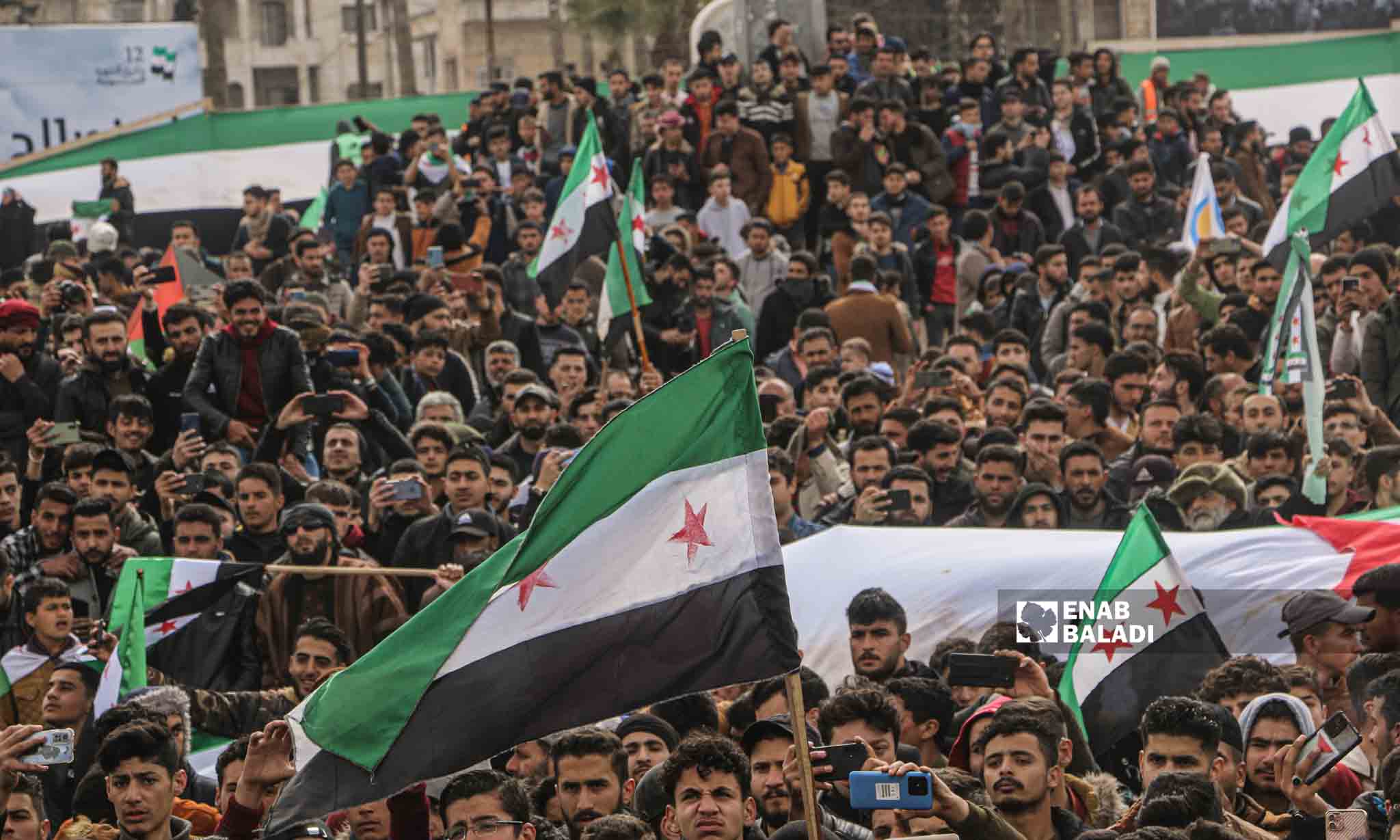
A demonstration in Idlib city to commemorate the 12th anniversary of the Syrian revolution – March 15, 2023 (Enab Baladi/Anas al-Khouli)
Raids and domestic control, battles are over
Abu Mohammad al-Jolani, Commander-in-Chief of Tahrir al-Sham, repeated during his appearance that the battle in the near and far perspective went in the interest of the revolution, and that the battle has costs and Tahrir al-Sham is ready for it, and that “the word belongs to the one who has power on the ground.”
Enab Baladi contacted the Media Office of Tahrir al-Sham and asked questions about whether there is a vision to change the map of military control in the region, the expected time plan for that, and the extent to which Tahrir al-Sham possesses the ability and tools to open fronts or carry out military action, the obstacles in front of that, and its future vision of the reality of military action in the region.
Enab Baladi did not receive a reply until this report was published.
Nawar Shaaban, head of the Information Unit at the Omran Center for Strategic Studies, said that the opposition factions in northwestern Syria do not have the desire to launch ground attacks that may result in geographically wide bombing operations, in addition to that they have become aware of the details of the general agreement that is taking place between countries.
In his interview with Enab Baladi, Shaaban added that the stage of changes due to military action is over, and if the region witnesses changes, they will be limited within international agreements.
The factions have become certain that the most military action they can carry out is the same as what the regime and its allies carry out in terms of targeting and raids, but the difference is that the regime and its militias target civilian sites, while the opposition forces attack barracks and military points.
The expert in military affairs believes that the factions focus this year on internal control, limiting smuggling operations from regime-controlled areas, pursuing cells of the Islamic State organization, targeting regime cells that carry out bombings in the region, and unifying the security form in SNA-held areas.
According to Shaaban, “the military formations that stabilize the internal security situation and secure the movement of civilians and the work of organizations are the ones that have become of great basic effectiveness and may have a certain role in the stage of international agreements.”
These operations are within which the opposition forces can operate and develop, says Shaaban, pointing out that the disciplined security situation in northern Syria during the period following the earthquake that struck the region last February proves the reality of the control of local forces.
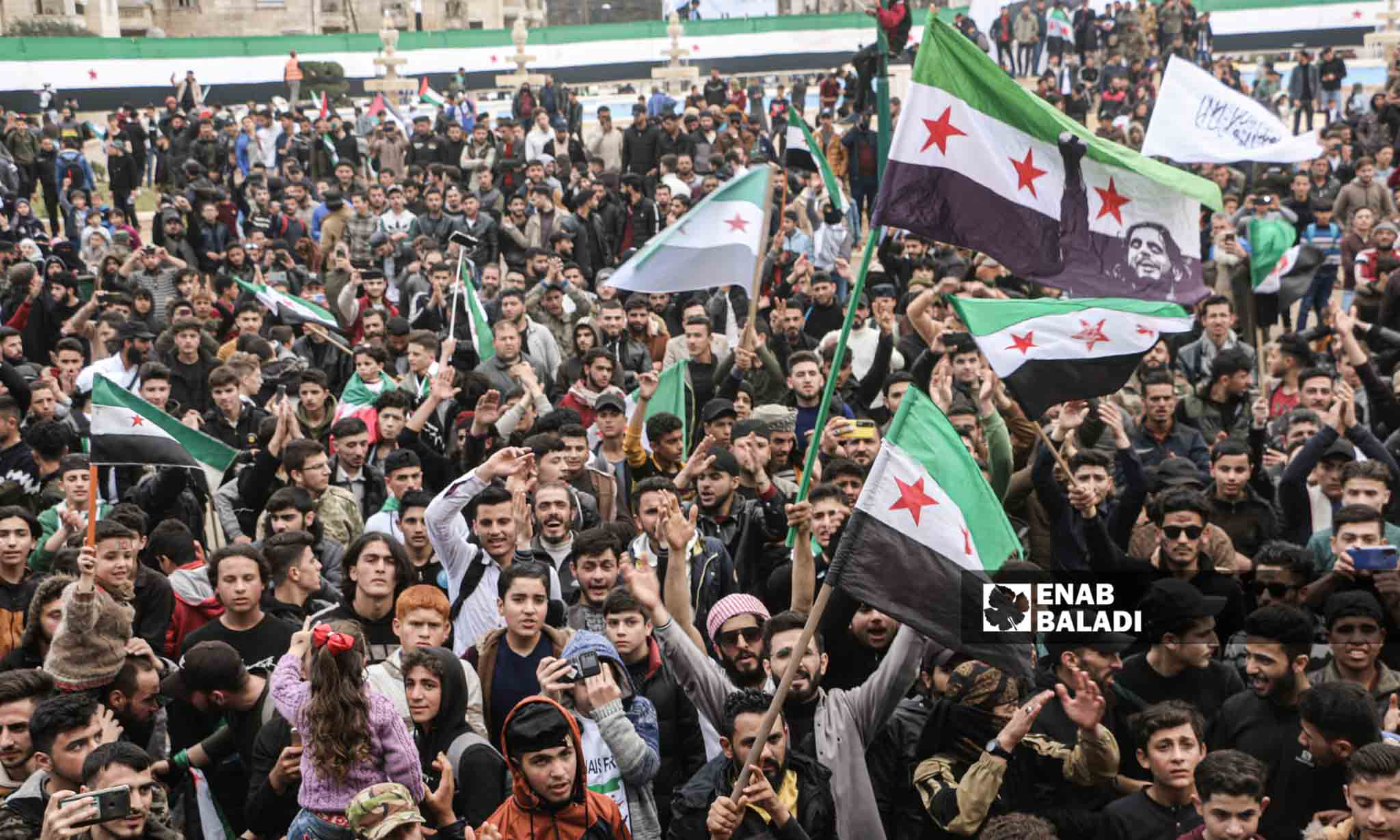
A demonstration in Idlib city to commemorate the 12th anniversary of the Syrian revolution – March 15, 2023 (Enab Baladi/Anas al-Khouli)
|
The military formations that stabilize the internal security situation and secure the movement of civilians and the work of organizations are the ones that have become of great basic effectiveness and may have a certain role in the stage of international agreements. Nawar Shaaban, Head of the Information Unit at the Omran Center for Strategic Studies |
Political path in “clinical death,” who is responsible?
A military side that has stopped for the forces of the revolution and the opposition in northern Syria is matched by a completely suspended political side.
Amidst the exchange of accusations and responsibilities for diluting and freezing it, as no meetings of the Syrian Constitutional Committee (SCC) have taken place within the framework of the only process sponsored by the UN for more than nine months, which shows the inability of the Syrian official opposition to present any new solutions to ensure that the process moves forward.
Dr. Ibrahim al-Jbawi, member of the Syrian Negotiation Commission (SNC), considered in an interview with Enab Baladi that the Syrian regime is responsible for obstructing the political track in general and the track of the Constitutional Committee in particular, with the “public and scandalous” support and guidance of its allies in Tehran and Moscow.
Al-Jbawi said that the indolence of the international community, especially the active countries in the Syrian issue, and the lack of seriousness in finding a comprehensive and just solution is a major factor that bears a great responsibility in obstructing the political process.
The former army brigadier explained that during the previous years, and specifically since the countries agreed to consider Resolution 2254 the sole reference for a political solution in Syria, the international community did not press real and sufficiently to implement this resolution but was content with statements while the Syrian regime and its allies were obstructing any serious steps.
|
What made the tragedy grow and exacerbate is the regime’s dependence and bet on a military solution, and the international community’s transformation into a mere spectator or observer of what is happening and what happens to the Syrians, and its failure to pay attention to the cause of a people seeking freedom and dignity. Dr. Ibrahim al-Jbawi Member of the Syrian Negotiation Commission |
For his part, the former head of the National Coalition for Revolutionary and Opposition Forces, Khaled Khoja, believes that the political track originally requires military and popular pressure on the ground to force the parties to negotiate.
In an interview with Enab Baladi, Khoja believes that the Syrian opposition, with its political and military sides, has become the weakest of the existing parties. Therefore, the Syrian opposition, whether it be a “Constitutional Committee,” a “Coalition,” or factions, cannot have weight on the table unless it has weight and actual control on the ground. This does not exist, he added.
The Negotiation Commission is subject to criticism and accusations of incompetence, failure, and failure to provide any political solutions, interspersed with demands to make way for other people who possess political tools different from theirs, who may hold a solution or part of the solution.
Al-Jbawi said that the Negotiation Commission, since its establishment, has communicated with all countries and coordinated with the international envoy, and attended the meetings to which it was invited or requested to be held. However, it was the regime that was and continues to block any effort towards a solution.
The Commission has not accepted any waiver of any of the rights or objectives of the Syrian people and its revolution, al-Jbawi added.
The former head of the Coalition, Khaled Khoja, believes that the notion of a Negotiation Commission separately means a body separate from what is happening on the ground, which is basically an unsound and useless idea, and believes that replacing this commission with another body that does not emanate from active forces on the ground will not have any effect, and it would be useless and absurd to do so.
Khoja mentioned that perhaps before 2016, if the factions that had weight and control over the land with their various names had emerged from a political body, things could have changed in any political track, and that was contingent on the support of neighboring countries or the US.
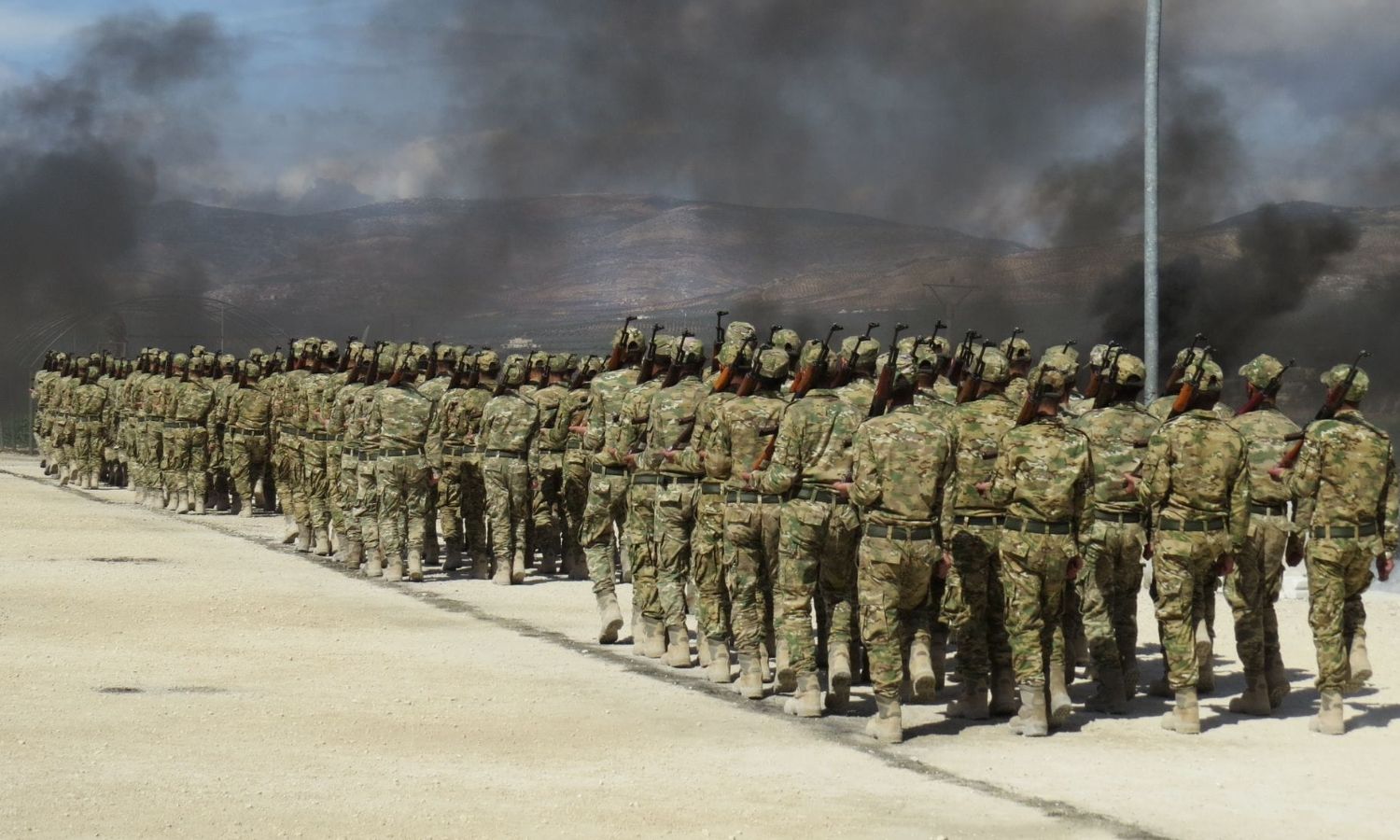
Graduation ceremony for a new batch of SNA fighters in Afrin region, north of Aleppo – March 7, 2023 (Facebook/Media Office of the Interim Government’s Defense Ministry)
Regional interests rule
Regional countries stand on opposite sides of their relationship with the Syrian regime after 12 years of the Syrian revolution. The conflict resulted in a political stalemate that did not help the Syrians to reach a solution to end their suffering.
The State of Qatar has not changed its position in support of the revolution, and its most recent statements by the Ministry of Foreign Affairs show its adherence to a political solution agreed upon by all parties.
Doha has supported the political process, starting with the establishment of the Syrian National Coalition on its territory in 2012, and it is the only country that hosts an ambassador for the National Coalition after severing its official relations with the Syrian regime.
Saudi Arabia was also a supporter of the Syrian revolution and hosted several meetings of the opposition, through which the High Negotiations Committee was established in 2015, and it repeatedly declared its refusal to keep the head of the Syrian regime, Bashar al-Assad, in power, before abandoning this demand in recent years, and recently speaking of “the necessity of a dialogue with the regime.”
On the other hand, the Emirati position on the revolution witnessed a political turning point after it was committed to the Gulf decision in 2012 to close its embassy and sever relations, only to re-open it in 2018, justifying its move by saying that the Arab role in Syria has become “more necessary in the face of the Iranian and Turkish regional incursion.”
The UAE is currently leading efforts to normalize relations with the Syrian regime and bring it back to the Arab League on the one hand and is participating in talks to settle relations between Ankara and Damascus on the other.
According to a report by the Saudi Asharq Al-Awsat newspaper, on January 8, the UAE sought to have a role in sponsoring the Syrian-Turkish normalization through a government official joining the talks or by hosting the meetings.
The Turkish openness to the Syrian regime, through a political discourse desiring rapprochement, and meetings between senior officials at the level of ministers between the two parties, prompted by Russia, presents an image of the transformations that Syria witnessed and affected the paths of the revolution over the course of 12 years, which caused the failure to achieve any of its main goals, especially with regard to the political transition in government and the overthrow of the regime.
Turkey sponsored the Syrian political opposition, supported the military factions, and sought, through the Sochi track, to resolve the Syrian situation with Russia and Iran before its demands converged “to eliminate security threats on its borders and to solve the Syrian refugee crisis in its country,” as a goal of settling its relations with the Syrian regime, according to statements of its officials.
Iran, target of rapprochement and cause of failure
The goal of distancing the Syrian regime from Iran was the pretext with which the Arab countries justified their efforts to restore relations with it, with Russian push and a repetition of the American rejection of these directions.
However, the indicators carried by the first weeks of 2022 reflected the regime’s bet on Iran, and these indicators were embodied in more agreements and official meetings between the two parties, according to a report by the Syrian Dialogue Center issued at the beginning of the year.
Khaled al-Ezzi, Ph.D. in International Relations, told Enab Baladi that Russia and America, through their military intervention, were able to distance the Arab incubator from containing the Syrian issue, while Saudi Arabia’s return to dialogue, and before it, the UAE, proves that the Arab countries made a mistake by leaving the Syrian arena to Iranian influence.
Dr. al-Ezzi believes that the influential Arab countries, led by the UAE and behind it Saudi Arabia, are trying to stop Iranian expansion in Syria, even if that is from the regime’s gate, so they offered him conditions that prepare him for his disengagement from Iran, while Ankara is rushing to negotiations with Damascus for reasons of its national security, and under internal pressure for the return of Syrian refugees.
Saudi Arabia has conditions for settling relations with the regime by returning to the requirements of the Geneva Convention, making reconciliations with the opposition, building a new constitution, and returning refugees in exchange for reconstruction in Syria, according to al-Ezzi.
The researcher explained al-Assad’s visits to the Sultanate of Oman and the UAE in connection with Arab mediation and the provision of conditions for sponsoring the transitional period, far from “normalization” with him or providing support for him, but Iran is still thwarting these plans.
Al-Ezzi believes that the current “weak” situation of Iran may push it to change its political role in the region after the latest Saudi-Iranian agreement, which may include settlements for several regions in Syria, Iraq, and Yemen, while the previous Arab plans did not succeed in distancing al-Assad from Iran, which is very active in Syrian regime policy.
Saudi Arabia and Iran agreed to resume diplomatic relations between the two countries during the next two months, provided that the opening of embassies takes place within the same period.
Arab countries, especially the Gulf countries, are afraid of the Iranian role in the demographic change in Syria, which has caused the asylum and displacement of about 12 million Syrians on the one hand, and the importation of Shiite ethnicities from Iran, Iraq, Afghanistan, and Lebanon on the other, according to al-Ezzi.
Regional and Arab countries are accelerating their attempt to engage in the Syrian cause, taking advantage of the international vacuum left by the United States in Syria, similar to Russia, which is preoccupied with its war in Ukraine, according to the academic in international relations.
Iran has strengthened its military presence in several areas in Syria after the partial withdrawal of the Russian forces, which are focusing their efforts on the war with Ukraine, which is also a priority issue for the administration of US President Joe Biden.
Iran has contributed to supporting the regime militarily and economically since the beginning of the revolution through militias affiliated with it from Iraq and Lebanon, such as Hezbollah. The Quds Force and the Iranian Revolutionary Guard (IRG) also had an active presence in the region.
The Iranian presence has extended over the years in most of the areas controlled by the Syrian regime, except for the coastal region, the stronghold of al-Assad, in which Russia has a dominant presence.
Subject to Russian-American influence
Attention is always directed towards Washington when talking about any rapprochement or a change in the position of the Syrian regime with regard to the influential regional countries because the United States has an influence in stopping these efforts from a political point of view, or from an economic point of view through the deterrence of its sanctions imposed on those who deal with the regime.
Ahmed Qassem Hussein, a researcher at the Arab Center for Research and Policy Studies, told Enab Baladi that the Syrian issue has undergone major transformations during the past decade, first linked to the directions of US foreign policy under successive administrations.
The approach of the administration of former US President Barack Obama was “a security policy tinged with a lot of hesitation,” which he explicitly expressed in his memoirs, according to the academic in international relations, who believes that it paved the way for greater roles for regional powers to intervene in Syria, but “the contradiction between them complicated the political and military scene in it.
After its military intervention in Syria, Russia worked to rehabilitate the Syrian regime, especially after the latter’s military control of the cities of Aleppo, Daraa, the countryside of Damascus, and Homs. Russia succeeded in achieving this goal with the UAE and is mediating with Turkey for it.
|
The regional powers in the Arab region are unable to make a “major breach” in the wall of the Syrian issue because the main actor is the United States, and any change in its foreign orientations or the determinants of its dealings with the regime will bring about a kind of change. Ahmed Qassem Hussain, Ph.D. in International Relations and a researcher at the Arab Center for Research and Policy Studies |
The courses of dealing with the regime are adopted in a way that goes beyond all international resolutions and negotiation tracks in Geneva, Sochi, and Astana, based on the security and political needs of the regional countries, according to Hussein, who believes that restoring the relationship with the regime did not contribute to resolving the economic crisis afflicting its areas of influence, and did not bring about any change in finding a political solution.
The former head of the National Coalition, Khaled Khoja, told Enab Baladi that the regional equation changed in Turkey after 2016, as Turkey was indirectly confronting the regime and Russia.
However, after the downing of the Russian plane in 2015, things turned around and Turkey became closer to the Russian position on the issue of a political solution, as it pressured the Syrian opposition to engage in the Astana talks, which Turkey had previously opposed.
A regional initiative has emerged, described as a withdrawal from the circle of regime change and holding its heads accountable to the circle of modifying its behavior and finding humanitarian and security approaches to the scene that achieve the interests of the actors involved and affected by the conflict in Syria, according to the report of the Syrian Dialogue Center.
An initiative that resulted from the continuing state of political intractability, which was reinforced by the conflicting interests of international and regional actors, the weak influence of local actors, and the shrinking margins of their influence.

Sultan of Oman Haitham bin Tariq Al Said receives the head of the Syrian regime, Bashar al-Assad, in Muscat – February 20, 2023 (Syrian Presidency)
International parties still in solidarity, nothing more
Despite the decline of the Syrian file on the list of priorities of the supporting countries in recent years, the position of the international parties towards the Syrian revolution has not changed over the years.
Questions abound about the position of the major influential countries in the Syrian file, their tools for change, and their vision for the future of the file in light of the current facts, amid the absence of local tools to change the reality of the stalemate in Syria and the conflicting interests of regional countries.
Most complex on planet
In the last briefing of the UN Special Envoy to Syria, Geir O. Pedersen, on February 28, he described the Syrian file as one of the most complex political scenes on the planet.
Pedersen added that the complexity comes from the existence of a region divided into several areas of control, a government subject to sanctions from major donors, de facto authorities elsewhere and more than one listed terrorist group, five foreign armies, mass displacement, systematic violations and abuses of human rights, and deteriorating, corrupt or absent institutions, destroyed infrastructure, collapsing economy, drug trafficking, extreme poverty, and growing needs.
Pedersen considered that the situation in Syria is unsustainable and totally unacceptable and that only the Syrian people pay the price.
In order to reach a solution in Syria, it is necessary to build bridges of communication with the stakeholders and all the main Arab players, the players of the Astana track, the United States, and all European players, Pedersen believes.
|
I should not even use the term frustration, I think we all feel deep pain from the fact that the political process has not delivered to the Syrian people. It’s been going on for 12 years, and we have not seen a political willingness by the parties to move forward and there has been a lack of international cooperation to make this possible. Geir O. Pedersen, The UN Special Envoy to Syria |
US: Stalemate is caused by Syrian regime
Regarding the stalemate in the Syrian file and the responsible parties, and the role of the European Union in this context, Enab Baladi contacted the press office of the Chargé d’Affairs of the European Union Mission to Syria, Dan Stoenescu, but he apologized for not answering the questions, due to “the inability to conduct press interviews.”
An official in the US State Department stated to Enab Baladi via email that the United States was consistent in its message to all parties that there could be no military solution to the conflict.
The political solution remains Syrian-led, represents the will of all Syrians as outlined in UN Security Council Resolution 2254, and is the only viable solution to the conflict, according to the official.
The official considered that the United States continues to urge all parties to fully engage in this process and support the efforts of the United Nations envoy to Syria, but it is clear that the problem lies largely with the regime.
Concerning the repeated criticisms of major countries regarding the decline of the Syrian file on the top of their priorities, the US State Department official said that the Syrian regime still constitutes the main obstacle to achieving progress towards a political solution to the conflict and before the Constitutional Committee.
|
The (Syrian) regime must enable its delegates to negotiate in good faith for the sake of the Syrian people, as set out in Security Council Resolution No. 2254. An official at the US State Department |
Everyone’s responsibility
The priorities of the major influential countries in the Syrian file (US, EU, Russia, Iran, Turkey, and others) do not intersect with the issue of the Syrians, which makes the stagnation of the Syrian file a “non-annoying” issue for them, even if some of them are not satisfied with it according to their political literature, according to what the researcher in political and economic studies, Dr. Salam Kawakibi, thinks.
Kawakibi said in an interview with Enab Baladi that the European Union is preoccupied with the Ukrainian issue, and the rest of the countries are preoccupied with more important matters to them. The US has China, Russia has all the West, Iran has the stability of the regime and neutralizing the elements that threaten the continuation of the mullahs’ regime, and Turkey has the elections.
Regarding the tools that these countries possess to change the reality, Kawakibi believes that European countries and the US hold very influential cards, including those related to the reconstruction that the international community calls for through the United Nations.
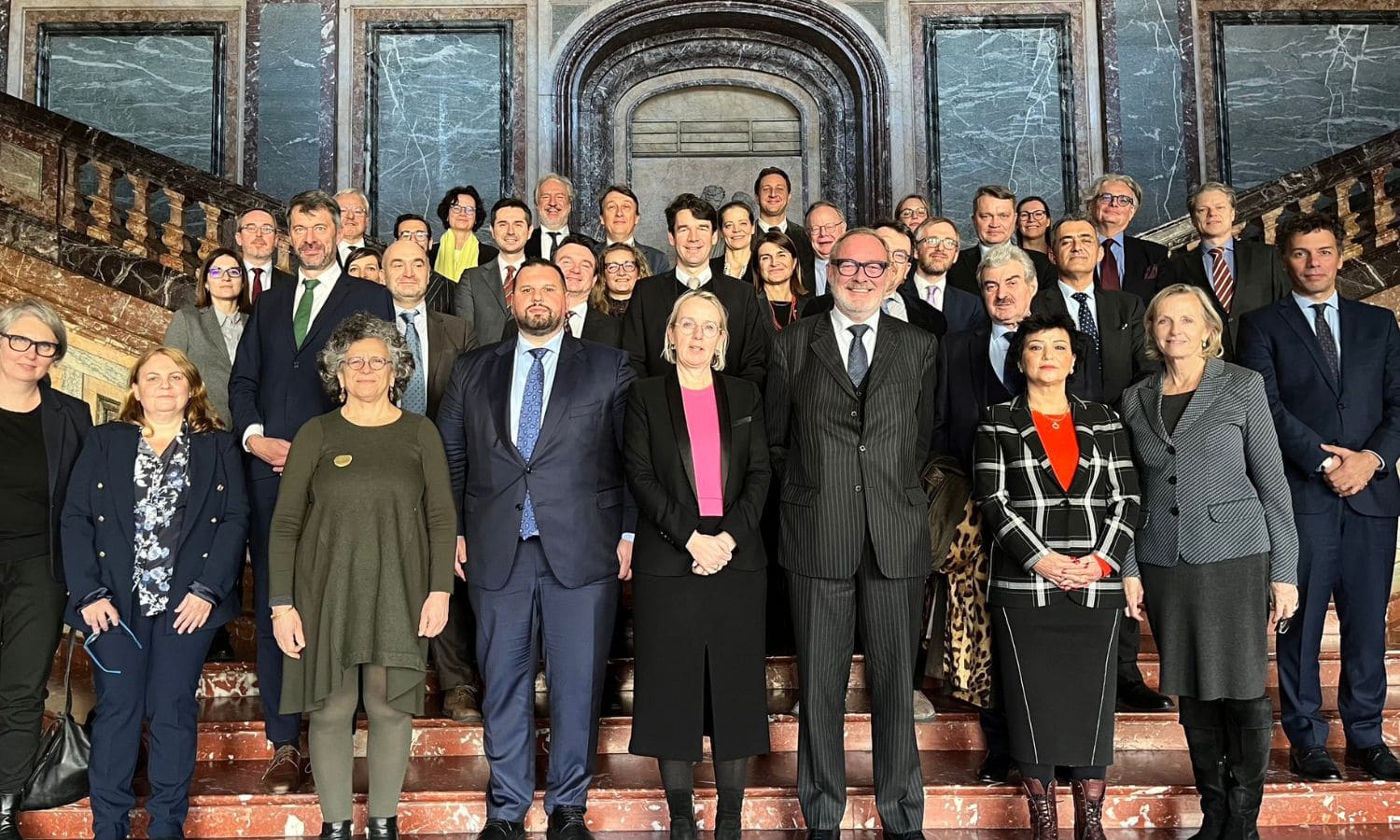
Representatives of the EU countries in Brussels to discuss the situation in Syria – January 17, 2023 (Twitter/Helen Le Gal)
|
Several parties bear the responsibility for the stagnation of the Syrian file, such as the Syrian regime, which bears a large part of the responsibility when it thwarted the Geneva 1 negotiations in 2012, the shabby, weak, and dispersed Syrian opposition, in addition to international and local parties, as well as the countries supporting the regime that deals with the file under the bargaining principle and using the file to its advantage. Dr. Salam Kawakibi, Ph.D. in Political and Economic Studies |
Not in the foreseeable future
The US State Department official believes that ending the “conflict” in Syria requires Russia to play a more constructive role, as America has always been open to dialogue with Moscow regarding Syria, according to him.
The regime must also change its behavior so that there is a sustainable end to the conflict in Syria, the official said.
In turn, the UN Syria Envoy, Geir Pedersen, believes that no actor or group of actors can resolve this conflict on its own, explaining that there must be a real political process led and owned by Syria and facilitated by the United Nations, accompanied by a coordinated international effort to support that, as all major actors must work in a cohesive effort.
There is no solution to the Syrian file in the short or medium term, according to what Dr. Salam Kawakibi believes, expressing his pessimism in this context, justifying this by the fact that it does not bother anyone, as none of the parties is in a hurry to reach a positive future for the Syrian file.
The file remains awaiting a solution in which the interests of the influential countries in Syria (Turkey, Russia, and Iran) are preserved, and the West does not come out with a completely dirty face, and it will be at the expense of the Syrian people.
According to Kawakibi, such a solution will at least end the killing with the possibility of an awareness-building process that may last for decades so that a future generation capable of the peaceful process of change will emerge from it, away from falling into the international and regional trap that exploited the file and used it to its advantage.
if you think the article contain wrong information or you have additional details Send Correction
النسخة العربية من المقال
-
Follow us :
Most viewed
- Turkey moves to deploy air defense system in Syria
- Intentions for popular resistance amid Israeli escalation in southern Syria
- SDF to withdraw from Aleppo neighborhoods following agreement with Damascus
- Washington's conditions raise questions about its openness and goals in Syria
- Syrian returnees celebrate first Eid after liberation












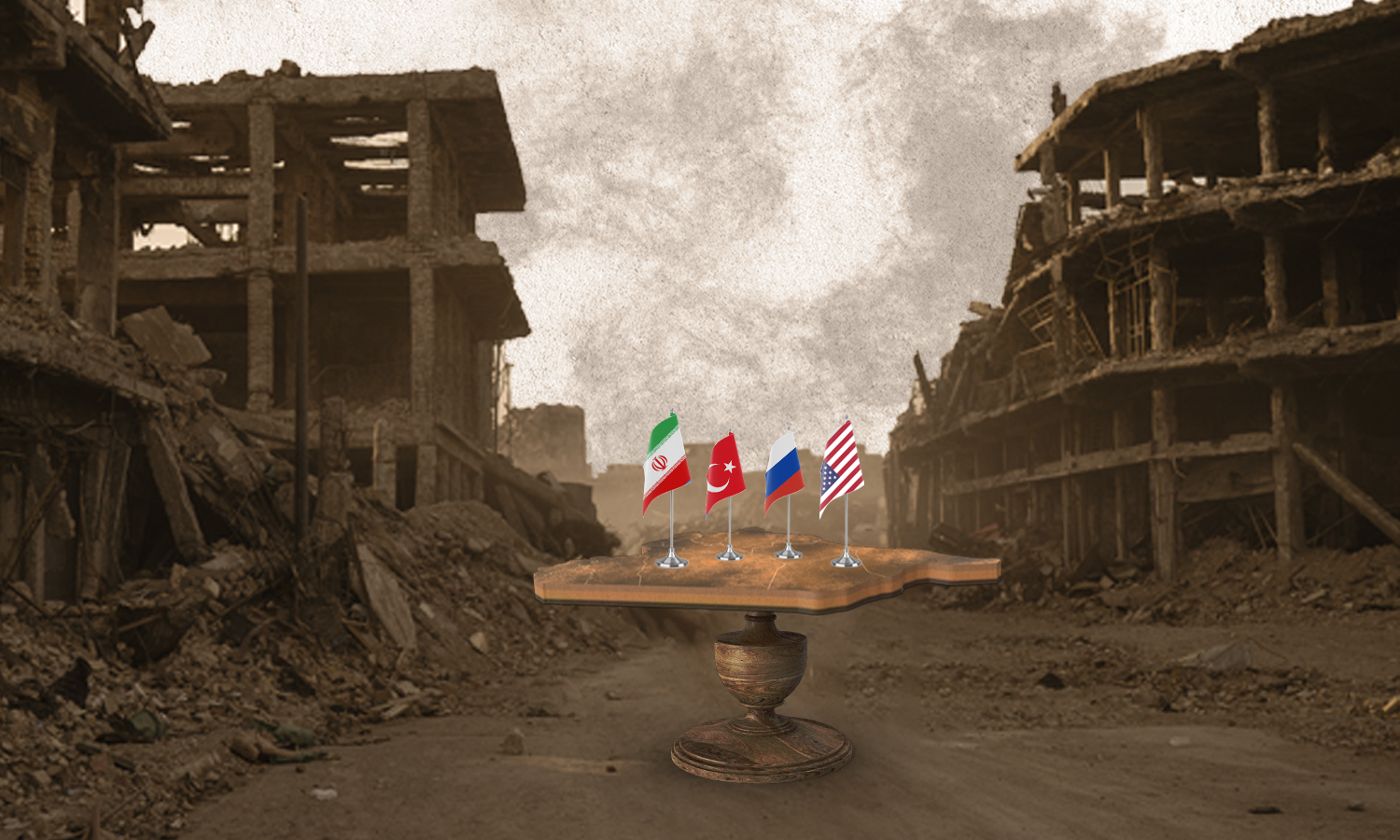
 A table with the flags of the US, Turkey, Iran, and Russia in a destroyed street in Syria (edited by Enab Baladi)
A table with the flags of the US, Turkey, Iran, and Russia in a destroyed street in Syria (edited by Enab Baladi)





 A
A
A
A
A
A
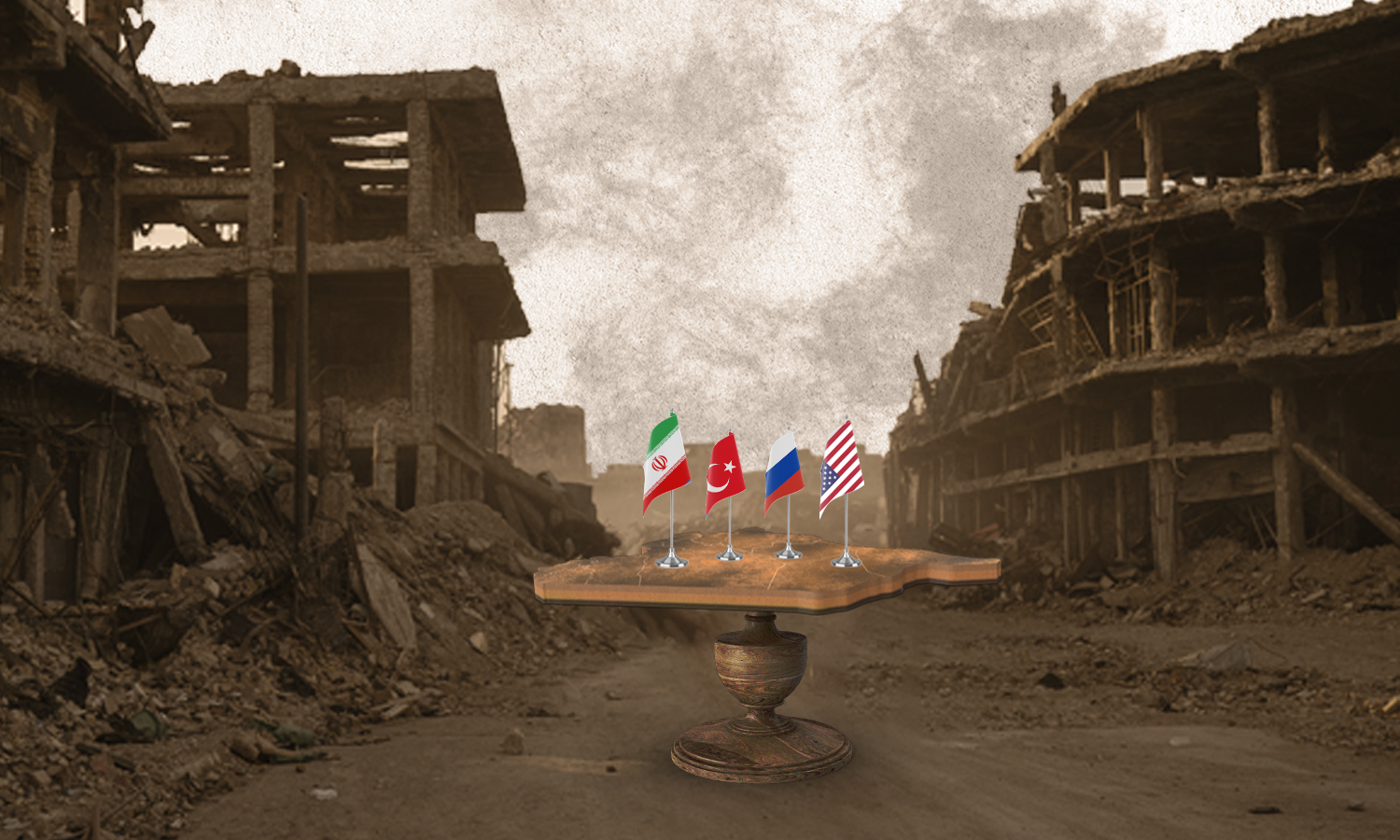







 More In-Depth
More In-Depth